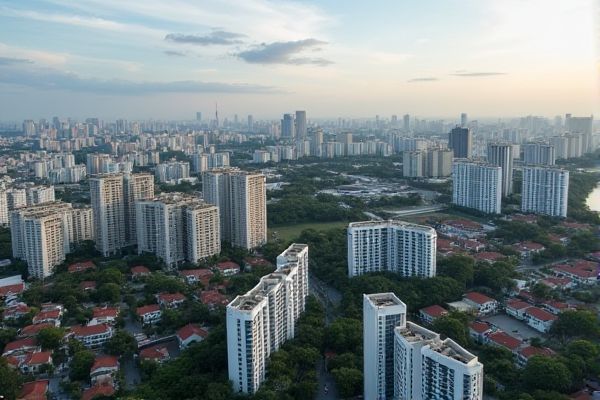
Education system and best schools in Thailand: Education structure: Kindergarten to university. Basic education: Primary and secondary levels. Thai Ministry of Education: Governing authority. International schools: Available across major cities. Thai curriculum: Government-endorsed, national focus. English Program schools: Bilingual education options. Best international schools: Bangkok, Chiang Mai, Phuket. Curriculum choices: IB, British, American systems. School year: May to March. Admission process: Requires documentation and assessment.
Education structure: Kindergarten to university.
The Education System in Thailand follows a centralized national curriculum and is structured into several levels: pre-primary education (ages 3-5), basic education comprising six years of primary education (Grades 1-6) and three years of lower secondary education (Grades 7-9), followed by three years of upper secondary education (Grades 10-12), which can be either general or vocational. Higher education includes universities, colleges, and vocational institutions offering various degree programs. For a more detailed understanding, an insightful overview can be found on the QAHE website, which delves deeper into the intricacies of Thailand's educational structure.
Basic education: Primary and secondary levels.
The education system in Thailand is governed by the Ministry of Education, ensuring that basic education is free for the first 12 years. Primary Education, or Pratom Suksa, is compulsory and spans six years, catering to children aged 6-11. Following this, Secondary Education, known as Mattayom Suksa, is divided into lower levels for ages 12-14 and upper levels for ages 15-17, each lasting three years. The curriculum emphasizes a range of core subjects, including Thai language, mathematics, science, and social studies. For those interested in understanding [Education in Thailand](https://www.expatica.com/th/education/children/education-in-thailand-2172858/), exploring the structure and subjects offered can provide valuable insights into the country's educational priorities and methods.
Thai Ministry of Education: Governing authority.
The Ministry of Education (MOE) in Thailand is the governing authority responsible for overseeing the entire education system, from pre-primary to higher education. It formulates education policies, allocates resources, monitors education provision, and coordinates various educational programs, including formal, non-formal, and informal education, to ensure equitable and quality education across the country. For more information, you can visit the official Ministry of Education website.
International schools: Available across major cities.
Thailand boasts a remarkable total of international schools spread across 18 major cities, including Bangkok, Chiang Mai, Pattaya, and Phuket. These institutions offer a range of curricula such as US, IB, and British, with notable schools like International School Bangkok, NIST International School, and Bangkok Patana School standing out for their academic excellence and diverse student bodies. For more comprehensive information, [the International Schools Database](https://www.international-schools-database.com/country/thailand) provides detailed insights and specifics about each educational offering in the country.
Thai curriculum: Government-endorsed, national focus.
Thailand's education system is centered around a centralized national curriculum, which sets educational standards and learning outcomes for different levels, including academic subjects, moral and ethical education, physical education, and extracurricular activities. Basic education is compulsory and free in government schools, with standardized examinations like the O-NET for upper secondary students.
English Program schools: Bilingual education options.
In Thailand, English Program (EP) schools within public schools teach many subjects in English, immersing students in the language to improve fluency, while bilingual schools offer education in both Thai and English, following the Thai National Curriculum and integrating international components to prepare students for both local and international higher education pathways. For more detailed information, you can visit the article on Education in Thailand on Expatica's website.
Best international schools: Bangkok, Chiang Mai, Phuket.
The best international schools in Bangkok include International School Bangkok (ISB), offering an American curriculum and IB Diploma, NIST International School with the IB programme, and King's College International School Bangkok following the British National Curriculum. For other regions, while specific top schools in Chiang Mai and Phuket are not detailed here, these Bangkok schools set a high standard for international education in Thailand. For more information on the top educational institutions, you can visit the Good Schools Guide.
Curriculum choices: IB, British, American systems.
Thailand offers various international education systems, including the British Curriculum, which involves IGCSE and A-levels; the American Curriculum, which includes elementary, middle, and high school with optional AP exams; and the International Baccalaureate (IB) Curriculum, known for its holistic approach and global awareness, with programs for students aged 3 to 18. These systems are implemented in different international schools, each with its own unique features and recognition globally. For more insights, you can explore the offerings at St. Andrews Dusit International School, which showcases a diverse array of educational approaches tailored to meet students' varied needs and aspirations.
School year: May to March.
The Thai education system follows a school year from May to March, divided into two semesters with a break in October and a longer break from March to April. The system includes six years of primary education, three years of lower secondary education, and three years of upper secondary education. There are competitive entrance exams for prestigious schools, and the calendar can vary for private and international schools. For more detailed insights, you can read about it on the Thai Education Overview page.
Admission process: Requires documentation and assessment.
The admission process for international schools in Thailand typically requires documentation, including transcripts, birth certificates, and sometimes medical records, as well as assessments such as entrance exams or interviews to evaluate the student's academic and language proficiency. For those looking for comprehensive guidance, The Good Schools Guide provides valuable resources and insights into the best educational institutions in Bangkok.
